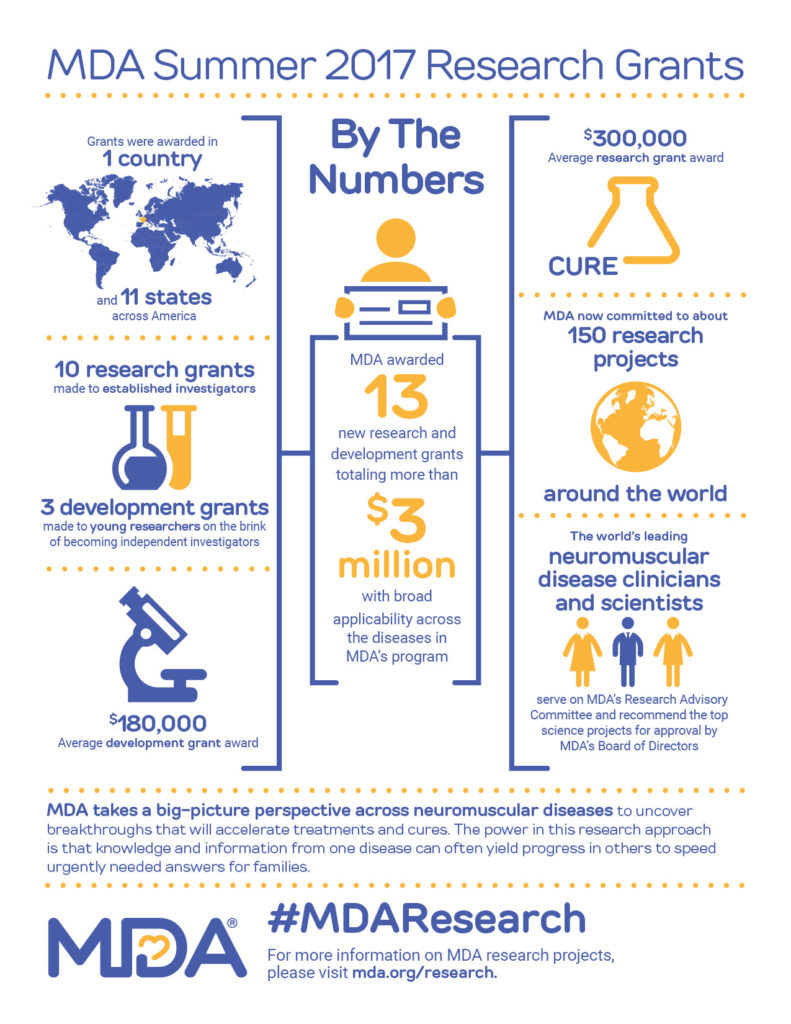
Could genetic modifiers (genes that minimize or exacerbate symptoms) explain why some people who have disease-causing genes for facioscapulohumeral muscular dystrophy (FSHD) seem to be “resistant” to the disease? Could the drug dimethyl fumarate, or DMF, already approved by the U.S. Food and Drug Administration (FDA), be rapidly developed to treat mitochondrial disease? Could a modified antisense therapy be effective as a treatment for spinal-bulbar muscular atrophy (SBMA)?
Neuromuscular disease researchers are looking for answers to these and other questions as they work to find treatments — and MDA is providing support to help ensure their success.
In August, 13 new MDA research and development grants with a total funding commitment of $3.5 million began supporting research projects around the world aimed at answering questions, finding solutions and making breakthroughs that will lead to treatments and cures. The new projects are targeted to make an impact that can be felt across the diseases in our program.
In addition, with these new projects we continue to build on recent successes. Over the last two years, four drugs that can trace their origins to MDA research grants just like the ones we’re announcing today have received FDA approval. In 2015, the FDA approved Keveyis for the treatment of periodic paralysis. In 2016, the agency approved Exondys 51 for the treatment of some forms of DMD, and Spinraza was approved to treat individuals with spinal muscular atrophy (SMA). And in February 2017, the FDA approved Emflaza to treat DMD, regardless of the genetic mutation underlying the disease.
Making progress, like we have with these new drugs, is the reason we are so optimistic about this new round of funding — because we know that every new grant has the potential to catalyze the next medical or scientific advance for MDA families.
New grants are in addition to other 2017 awards
 Making up MDA’s Summer 2017 grant cycle, the new awards are in addition to a number of others announced this year.
Making up MDA’s Summer 2017 grant cycle, the new awards are in addition to a number of others announced this year.
- Announced Jan. 24: An MDA clinical research network grant totaling $918,000 over three years is spurring advances in myotonic dystrophy (DM) research. The investment, which provides continued support for the Myotonic Dystrophy Clinical Research Network, supports five medical centers that specialize in DM research and clinical care.
- Announced March 9: MDA’s Winter 2017 round of research and development grants, totaling 29 awards worth more than $7 million, began funding projects covering a number of diseases in MDA’s program Feb. 1.
- Announced March 10: Izumi Biosciences in Lexington, Mass., was awarded an MDA Venture Philanthropy (MVP) grant totaling $96,360 to fund early-stage development of IZ10023, a type of drug called a “pharmacokinetic (PK) enhancer,” for use in people with ALS who are taking riluzole.
- Announced June 14: Michael Benatar, at the University of Miami Miller School of Medicine in Florida, and Jonathan Katz, at California Pacific Medical Center in San Francisco, were awarded a clinical research network grant to support their work on the Clinical Procedures To Support Research (CaPTuRe) project, which aims to implement the “ALS Toolkit,” a system to collect clinical data in such a way that it can be used for ALS research. The two-year award totaling $300,000 is supporting work conducted through Clinical Research in ALS and Related Disorders for Therapy Development (CReATe) aimed at lessening the burden on people with ALS to attend both clinical and research appointments.
- Announced July 11: Johanna Hamel, a neurologist at the University of Rochester in New York, was awarded a clinical research training fellowship for her work in comparative studies of RNA toxicity in DM. The two-year award — co-sponsored by MDA with the American Academy of Neurology and the American Brain Foundation — will provides a total of $130,000, including a $10,000-per-year stipend for tuition, to support Hamel’s work to shed light on the molecular processes that drive DM.
- Announced Aug. 30: Nicholas Johnson, assistant professor of neurology, pediatrics and pathology at the University of Utah in Salt Lake City, was awarded a human clinical trial grant totaling $598,348 over three years to conduct a natural history study in congenital myotonic dystrophy (congenital DM1).
- Announced Oct. 1: Maya Maor Nof, a postdoctoral research fellow at Stanford University School of Medicine in California, was awarded the 2017 SSSI-MDA Fellowship Award. The award, co-sponsored by Strength, Science & Stories of Inspiration (SSSI), will provide a total of $40,000 over two years to support Maor Nof’s work to shed light on the mechanisms underlying nerve cell death in ALS.
- Announced Nov. 3: Iron Horse Diagnostics in Scottsdale, Ariz., was awarded an MDA Venture Philanthropy (MVP) grant totaling $233,200 to support development of a prognostic (predictive) test for ALS.
All of these grants have the potential to lead to breakthroughs that will improve the lives of the individuals and families we serve.
Impact is felt across diseases
As an organization that covers dozens of neuromuscular diseases, MDA is leveraging the power of a big-picture approach in our search to find treatments and cures, with most, if not all, the research projects we support having the potential to further knowledge that can make an impact across all the diseases in our program.
That’s why we continue to support the world’s best scientists who are working on the most promising, most innovative, most cutting-edge science out there. With research investments totaling more than $1 billion over the last six decades, MDA has fingerprints on many major advances in neuromuscular disease research, and with these latest awards we are continuing to fund the science that will lead to the next medical and scientific breakthroughs poised to change lives.
MDA currently is funding about 150 research projects worldwide.
For more information on all the new grants, check out MDA’s Grants at a Glance.
Find out how you can fund cures and champion the cause at mda.org.
